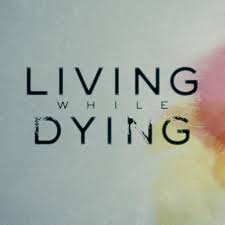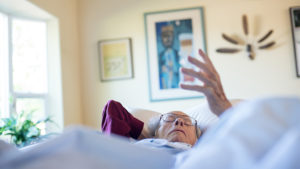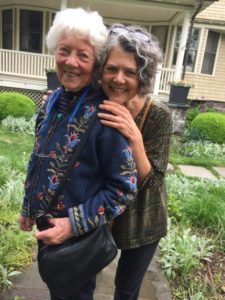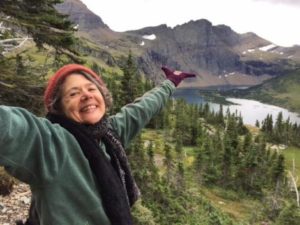
The point of Cathy Zheutlin’s poignant documentary, “Living While Dying”, is best expressed by the quote which opens the film: “The art of living well and dying well are one.” Zheutlin, a filmmaker who has reached the sixth decade of life, admits that she is afraid of death. That fear has kept her from talking about it. But as she faces the death of her mother’s long-time partner, she begins to accept that, “Death has been a dark hole of grief and suffering that I cannot deny anymore.”
The quest to face her own fear — coupled with her curiosity — results in a moving documentary that shows real people facing imminent death. Real people who chose to utilize hospice and non-medical approaches. Real people who demonstrated “living while dying.”
“My Cancer Was a Gift”
Zheutlin’s mother’s partner, Clair, is 92 and has been diagnosed with terminal prostate cancer. He requires constant care, which is a difficult proposition. Zheutlin’s mother talks about the difficulty of being a loving caregiver. In her head, she imagines the ideal caregiver to be sweet, loving and patient.

Peace Films
“Of course, I wasn’t ideal,” she laments, acknowledging that the human condition of fatigue and impatience sometimes overcame her best intentions.
Clair, lying in bed, hears the rhythmic tick of the clock in conjunction with the thump of his own pulse. He equates the sound to his life beating away.
When Clair tires of lying in bed just waiting to die, he gets up and begins tying up loose ends by giving away items in his garage. He decides to appreciate living. The film captures a joyful moment when Clair sits in a swing, holds on, leans back, and begins to gently swing back and forth. He says, “My cancer was a gift” because it bought heightened awareness of what it means to live each day.
He even jokes about his condition, smiling and gesturing with his hand to the sack he was carrying. “How many people do you think can carry their bladder in a shopping bag?”
Death as the Ultimate Comedy
Clair was not the only person in the film to use comedy to deal with impending death. One of Zheutlin’s friends, AvYitz, aka Alan “Rosie” Rosenberg, is younger than she is. He suffers from esophageal cancer that spread to his liver. “On the day of my diagnosis, I started notes for a comedy routine that saved my life.” AvYitz journaled about his treatments, his responses, his illness, and put them into a comedy routine called Rosey’s Last Stand-Up. He is buoyed by the people who listen and respond, who support him and laugh, instead of being maudlin.
AvYitz faces death head-on and determines to live while dying. “I am going to give as much as I can. Be present as much as I can. Experience as much joy as I can. Every moment.”
The film “Living While Dying” is an interesting mix of cultural experiences as well as personal ones. After the death of Clair, Zheutlin’s mother decides to start checking items off of her bucket list. At the age of 90, and acknowledging the increasing frailty of her body, she takes her daughters to Bali.
Cultural Perspectives on Death

Photo: Cathy Zheutlin
In Bali, Zheutlin meets an Aboriginal tribal elder, “Uncle Bob,” who physically demonstrates the separation of the body but not spirit that occurs after death. Uncle Bob walks into a darkened room a distance from his nephew. Then he calls out. His nephew can still hear him. Uncle Bob reminds the young man, “Spirit is eternal. That will never die.”
Zheutlin also attends a mass cremation ceremony that occurs once every five years in Bali. She was touched by the connection of the living to the dead in such a ceremony.
When Zheutlin returns to Portland, she meets a “death-walker,” a kind of “midwife for people who are dying.” The death-walker says, “To die with grace… when you share that with someone, you know that’s the way to go because of the example they have set.”
The Last Tango
From there, Zheutlin confronts the death of her good friend Don, who discovered he had only a short while to live. The prognosis was so dire that the medical staff repeated the diagnosis three times to make sure that Don truly understood the severity of the illness. He did not scream or cry. He simply decided that his goal was to live 15 days so he could take advantage of Oregon’s Death with Dignity law.
The next 15 days were spent with friends from his tango club, all of whom danced with him one last time. His family and relatives came to him and lingered in his presence, many of them camping out in his backyard until the date came for his death. His partner, Mary, gives him a final shave and talks about how he “became flooded with gratitude, caring for other people, and love.”
“Why Are People So Afraid?”
Zheutlin shares one more experience with her audience — that of Azul, who is also dying. Azul says, “Everybody tells me you’re sick. You should be in bed, but I just want to keep moving.” He does, saying, as Clair did before, that when he got the diagnosis, “I just got delivered a blessing.” He wonders why — if the images of heaven and nirvana are so beautiful — are people so afraid?

Photo: Peace Films
The recurring theme of Cathy Zheutlin’s documentary, “Living While Dying,” is that being given a deadly diagnosis can make you live more joyfully, see more fully, experience more deeply, love more completely.
Zheutlin has the courage to talk about the pain of death. No matter how calmly death is approached, no matter how the soul prepares for death, the body does not always go along. She touches briefly on the fact that death can be a difficult, torturous physical process as it was for Azul, who struggled for breath as he died.
Promoting Conversations About Death
By the end of the film, Zheutlin is able to talk to her own mother about death and what her mother wants to happen when she takes her “final nap.” Zheutlin then completes the circle by doing her own advance directives and talking to her daughter about what the filmmaker wants to happen when she dies.
In a review from The Berkshire Edge, Zheutlin says, “I’m not promoting an ideology, I’m promoting a conversation.” Indeed she does. “Living While Dying” is honest and poignant, and a healthy step in moving toward a culture that openly discusses death — because it will happen to us all.

 “Living While Dying” by Cathy Zheutlin
“Living While Dying” by Cathy Zheutlin


 “Help Me, Helen”
“Help Me, Helen”
 Recovering Cremation Remains After the Los Angeles Fires
Recovering Cremation Remains After the Los Angeles Fires
 “As Tears Go By” by Marianne Faithfull
“As Tears Go By” by Marianne Faithfull














